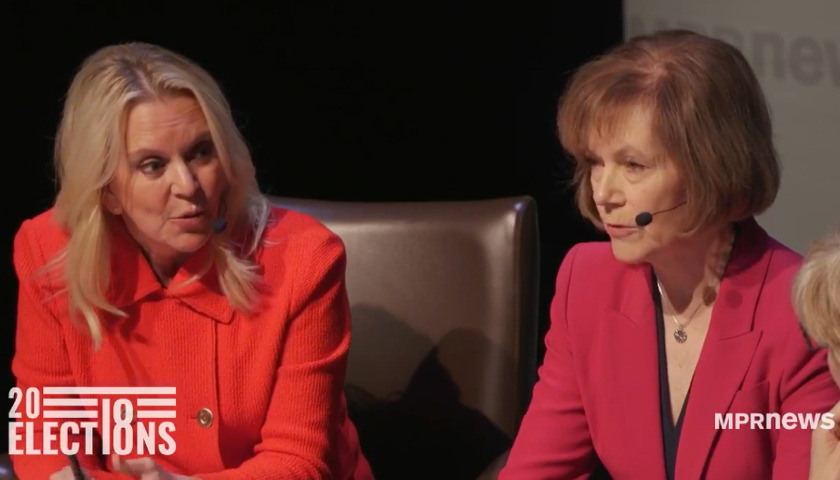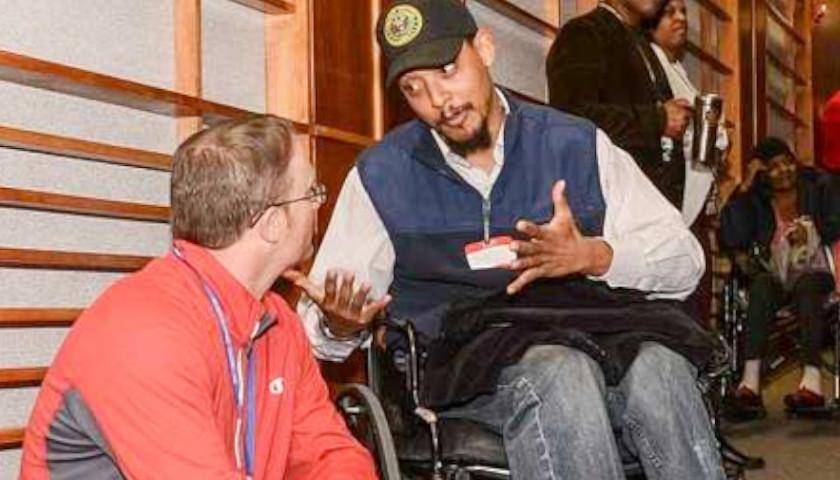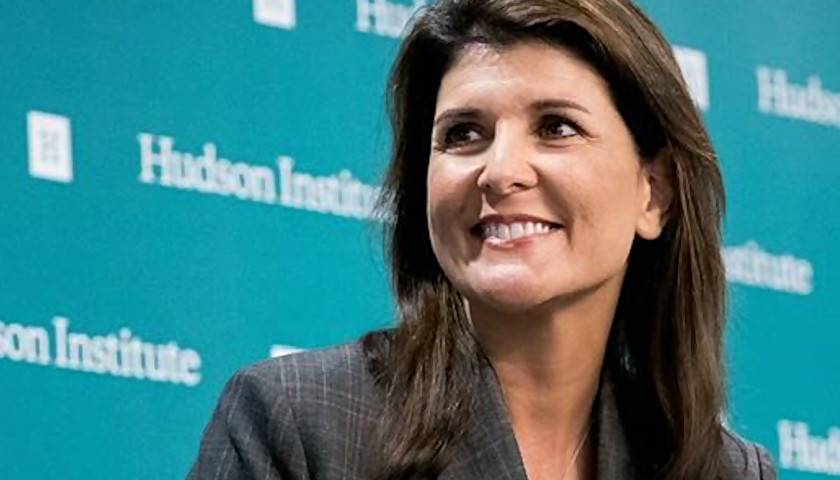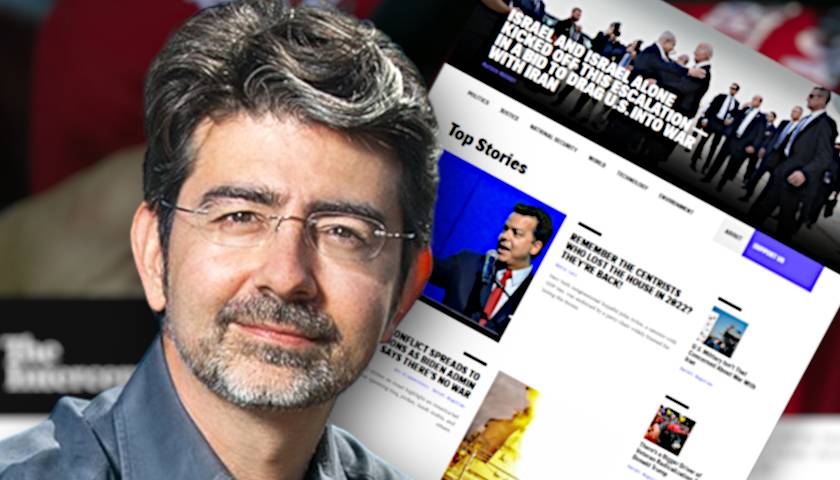Minnesota’ candidates running in the special election to replace Al Franken in the U.S. Senate met for their final debate Sunday night in front of a raucous crowd at St. Paul’s Fitzgerald Theater.
One of the topics discussed was the rise of incivility and “extremism” in politics, which was on full display during the debate between Sen. Tina Smith (D-MN) and Republican Karin Housley. At several points throughout the debate, Housley was heckled and jeered by audience members, despite the host organization’s alleged rules against doing so.
Moderator and MPR host Cathy Wurzer repeatedly attempted to quiet the audience, but with little success. When Housley suggested, for instance, that family separations at the border occured during the Obama administration, she was cut off by hecklers in the crowd.
“Parents and children were being separated at the border. Yes, they were,” Housley suggested. “I thought there were rules to this that they’re not supposed to be heckling out there in the audience. This happened at the last one, too.”
Wurzer agreed and said she would “try to go ahead and rein that in.”
“Sometimes it’s tough, especially in this political climate,” she continued, and was again required to quiet the audience later in the debate when Housley argued that birthright citizenship “is not the problem we have.”
Before Housley could elaborate on her positions, however, she was booed by audience members, who she claimed “get bused in” for the debates.”
“Please, audience, stop. Please!” Wurzer again pleaded.
Minnesota’s first all-female Senate race
Wurzer began Sunday night’s debate by noting that the special election is the first time the state has seen two female candidates go head-to-head for the U.S. Senate. As such, she started by asking the candidates about issues effecting women throughout the state, such as the “gender-based wage gap” and Minnesota’s Women’s Economic Security Act (WESA).
Housley voted against WESA while in the state legislature, though it was passed into law in 2014 while Smith was serving in Gov. Mark Dayton’s (D-MN) administration as lieutenant governor.
“Whenever you put women in their own category and not make them strong and tell them that ‘we have to make laws because you aren’t equal to men’—that’s the problem,” Housley explained, but Smith rejected her line of argument.
“So to me this isn’t a question of giving women special dispensation as Karin is suggesting. I think it’s a question of raising everybody up,” Smith responded, saying she “supported” WESA while serving in the Dayton administration.
“I think it was a good step forward in making sure that women would have opportunities,” she added.
Housley noted that she was against the bill because she doesn’t believe “we really need any more mandates on our small businesses,” since “that’s what squelches jobs.”
On the issue of a federal minimum-wage increase, Smith expressed her “support” for raising the national minimum wage to “$15 an hour.”
“In Minnesota, we raised the minimum wage. I’m proud of the work that we did,” she said. “This lifts up everybody. It allows opportunity for everybody.”
Housley, meanwhile, opposes a federal increase, saying that recent reports are showing that “the largest wage increase that happened” occurred “all on its own, with no government mandates.”
“So the Tax and Jobs Act that was passed in January, it’s actually happening. We’ve got economic growth at 4.2 percent, which they said couldn’t be done. We’ve got the lowest unemployment rate in 50 years. And now wages are increasing on their own,” Housley argued, saying the government should “let competition decide.”
Immigration and refugee resettlement
The two women expressed agreement on the current immigration issues facing the country, but disagreed on how the crisis is currently being handled. Both candidates would support a “comprehensive immigration reform package,” and agree with increasing “border security.”
“We do have to reform our immigration laws, but we do have to secure our borders. We have to know who’s here,” Housley stated, saying that “the reason that people are storming the borders is because our process takes way too long.”
Smith agreed with Housley’s calls for “reforming the legal immigration system,” but took it one step further, calling immigration “an economic issue.”
“We need people to do these jobs—that are taking care of our parents, that are working on dairy farms. We need people,” she reiterated later in the debate.
Housley criticized Smith for her opposition to a February bill that would have provided a pathway to citizenship for DACA recipients while granting Republicans funding for the border wall.
“Everything you said sounds really good, but Tina does really support open borders,” Housley said, and was again interrupted by audience members. “You had the opportunity to support the bill that was presented to you that would’ve kept the Dreamers here, and secured the borders and get people here legally, and you didn’t.”
“That bill was far from a comprehensive immigration reform package,” Smith responded, calling Housley’s criticisms “just not true.”
Another pressing issue, especially in Minnesota, is the federal government’s Refugee Resettlement Program, which Republican gubernatorial candidate Jeff Johnson hopes to indefinitely suspend in Minnesota.
Housley seemed to agree with Johnson’s proposal, pointing to communities in Minnesota, such as St. Cloud, that have raised questions about the cost of the program to the city, but were called racist and told to move to a different state by Dayton.
“How do we pay for them? Because it has overwhelmed some of those communities. We really do have to work with these communities where we are going to resettle them in,” Housley said, while Smith again touted the economic advantages of continuing the program.
Rising cost of health care
The debate later touched on the topic of health care and its rising costs to Minnesotans, who have consistently ranked the issue as their top priority heading into the midterms.
Housley called for increased competition in the health care market, saying that “people should be able to shop around and they should see what it costs at each place.”
“And then when it comes to the insurance side of it, we need to be able to buy our health insurance like we buy our car insurance, across state lines, because competition is the only thing that will drive costs down,” she continued. “Not a single-payer, government-run socialized medicine.”
The Republican also called for increased transparency among health care providers, a sentiment Smith seemed to agree with while touting her record of fighting to lower drug prices in Congress.
The hour long debate was the final face-to-face meeting between the two candidates, one of whom will finish out the remaining two years of Franken’s term. The latest polls show Smith with a narrow lead, though she was recently listed among the ten most vulnerable senators in America.
– – –
Anthony Gockowski is managing editor of The Minnesota Sun. Follow Anthony on Twitter. Email tips to [email protected].




